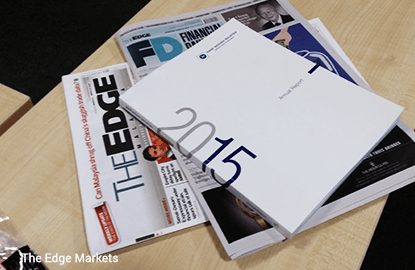
KUALA LUMPUR (March 23): Bank Negara Malaysia said its monetary policy this year would ensure sustainability of the nation's economic growth and stable consumer prices.
Bank Negara said in its latest annual report for year 2015 that its monetary operations would also take into account external capital flow volatility. The central bank said it would ensure sufficient liquidity in the domestic financial system.
"Monetary policy in 2016 will focus on ensuring monetary conditions remain supportive of the sustainable growth of the domestic economy, with price stability.
"This is against a challenging policy environment, characterised by the expectation of more moderate domestic growth, higher headline inflation and a high degree of uncertainty in the global and domestic environment," Bank Negara said.
Bank Negara said there were downside risk to global economic growth, due to weakness in advanced and emerging economies.
According to the central bank, energy and commodity price uncertainty and anticipation of world financial markets volatility are also crucial factors to look at.
"The implications of these developments on the domestic growth and inflation outlooks will be closely monitored during the year.
"In addition, monetary policy will also continue to consider the risk of financial imbalances," Bank Negara said.
Malaysia's economy, as measured by gross domestic product (GDP), is expected to grow between 4% and 4.5% this year, mainly on domestic demand expansion.
Bank Negara said domestic demand expansion would be mainly helped by private sector's spending. In 2015, Malaysia's GDP grew 5% from a year earlier.
Today, Bank Negara said it expected Malaysia's 2016 inflation, as measured by the consumer price index (CPI), to be higher at 2.5% to 3.5% in 2016. The CPI rose 2.1% in 2015.
In 2016, the inflation forecast took into account price adjustments of "several price-administered items" and the weaker ringgit, according to Bank Negara.
"The trajectory of inflation, however, could be more volatile, as it is subject to uncertainties such as those relating to global growth, global oil prices and the ringgit exchange rate," Bank Negara said.